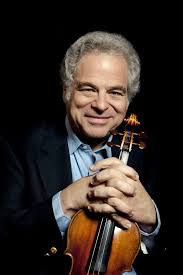This Week in Classical Music: August 26, 2024. Performers and Conductors. Few composers were born this week; we’ll name two: Rebecca Clarke, a British composer and violist, born on August 27th of 1886, in Harrow, and Johan Pachelbel, the German composer, famous for his Cannon in D, but in reality, a prolific composer, whose Hexachordum Apollinis, a collection of keyboard music, deserves to be known better. He was born on September 1st of 1653 in Nuremberg.
If we turn to the performers and interpreters – instrumentalists, singers, and conductors – those are aplenty. Itzhak Perlman was born on August 31st of 1945 in Tel Aviv. Perlman is deservedly famous: from about the mid-1960s to the mid-1990s he was one of the greatest violinists to perform actively; he then narrowed his classical repertoire and branched out into klezmer and jazz, while also teaching and conducting.Some criticize his playing as too romantic, but we think that’s unfair: Perlman made hundreds of recordings, many excellent, some phenomenal.His Beethoven’s piano and violin sonatas and Brahm’s violin sonatas with Vladimir Ashkenazy are of the highest order. Here, for example, is the recording of Brahm’s Violin Sonata no. 1 made by Perlman and Ashkenazy in 1983.
Three conductors were born this week, two Germans and one Hungarian who worked mostly in Germany.The native Germans are Wolfgang Sawallisch and Karl Böhm; the Hungarian is István Kertész.We’ve written about Böhm, one of the most important conductors of the 20th century but a deeply flawed personality, more than once, for example, here.Both Sawallisch and Kertész were born in the 1920s: Sawallisch in 1923, in Munich on August 26th, Kertész in 1929, in Budapest, on August 28th.Sawallisch took piano lessons as a child and continued his musical education at the Musikhochschule in Munich.As a young man, he fought in the German army during WWII and was captured by the British in Italy at the tail-end of it.At the age of 30 he conducted the Berlin Philharmonic, and at 34 became the youngest conductor to appear at Bayreuth, where he led the performance of Tristan und Isolde.In 1960, he became the principal conductor of the Vienna Symphony (not to be confused with the much more famous Vienna Philharmonic).For 20 years he was the music director of the Bavarian State Opera where he conducted 32 complete cycles of Wagner’s Der Ring des Nibelungen.From 1993 to 2003 he was the music director of the Philadelphia Orchestra.He died in 2013, months shy of his 90th birthday.
István Kertész’s life was much shorter, he was only 43 when he drowned while swimming in the Mediterranean in Herzliya, a town next to Tel Aviv, in 1973.Kertész was Jewish, as were so many other Hungarian conductors: Fritz Reiner, Antal Doráti, Eugene Ormandy (born Jenő Blau), George Szell, Ferenc Fricsay (only his mother was Jewish but that was enough to be prosecuted in anti-Semitic Hungary), and Georg Solti.In 1944 most of Kertész’s relatives were deported to Auschwitz and killed there.Kertész survived, went to study at the Ferenc Liszt Academy when the war was over, and had some conducting assignments after graduation.He and his family left Hungary after the 1956 Uprising and settled in Germany.From 1958 to 1963 he was the music director of the Augsburg Opera, where he conducted a wide repertoire.At the same time, he guest-conducted many major European and American orchestras.In 1964, he assumed the same position with the Cologne Opera and also became the principal conductor of the London Symphony Orchestra.István Kertész had an unusually broad repertoire, both in opera and orchestral music.He conducted many major orchestras and was the first choice of the Cleveland musicians to replace the departing Geroge Szell (instead, Lorin Maazel was hired by the board).
Richard Tucker, a wonderful American tenor (also Jewish – we seem to have a Jewish theme today) was born on August 28th of 1913 in Brooklyn, NY.We’ll get back to him another time.
Performers and Conductors, 2024
This Week in Classical Music: August 26, 2024. Performers and Conductors. Few composers were born this week; we’ll name two: Rebecca Clarke, a British composer and violist, born on August 27th of 1886, in Harrow, and Johan Pachelbel, the German composer, famous for his Cannon in D, but in reality, a prolific composer, whose Hexachordum Apollinis, a collection of keyboard music, deserves to be known better. He was born on September 1st of 1653 in Nuremberg.
August 27th of 1886, in Harrow, and Johan Pachelbel, the German composer, famous for his Cannon in D, but in reality, a prolific composer, whose Hexachordum Apollinis, a collection of keyboard music, deserves to be known better. He was born on September 1st of 1653 in Nuremberg.
If we turn to the performers and interpreters – instrumentalists, singers, and conductors – those are aplenty. Itzhak Perlman was born on August 31st of 1945 in Tel Aviv. Perlman is deservedly famous: from about the mid-1960s to the mid-1990s he was one of the greatest violinists to perform actively; he then narrowed his classical repertoire and branched out into klezmer and jazz, while also teaching and conducting. Some criticize his playing as too romantic, but we think that’s unfair: Perlman made hundreds of recordings, many excellent, some phenomenal. His Beethoven’s piano and violin sonatas and Brahm’s violin sonatas with Vladimir Ashkenazy are of the highest order. Here, for example, is the recording of Brahm’s Violin Sonata no. 1 made by Perlman and Ashkenazy in 1983.
famous: from about the mid-1960s to the mid-1990s he was one of the greatest violinists to perform actively; he then narrowed his classical repertoire and branched out into klezmer and jazz, while also teaching and conducting. Some criticize his playing as too romantic, but we think that’s unfair: Perlman made hundreds of recordings, many excellent, some phenomenal. His Beethoven’s piano and violin sonatas and Brahm’s violin sonatas with Vladimir Ashkenazy are of the highest order. Here, for example, is the recording of Brahm’s Violin Sonata no. 1 made by Perlman and Ashkenazy in 1983.
Three conductors were born this week, two Germans and one Hungarian who worked mostly in Germany. The native Germans are Wolfgang Sawallisch and Karl Böhm; the Hungarian is István Kertész. We’ve written about Böhm, one of the most important conductors of the 20th century but a deeply flawed personality, more than once, for example, here. Both Sawallisch and Kertész were born in the 1920s: Sawallisch in 1923, in Munich on August 26th, Kertész in 1929, in Budapest, on August 28th. Sawallisch took piano lessons as a child and continued his musical education at the Musikhochschule in Munich. As a young man, he fought in the German army during WWII and was captured by the British in Italy at the tail-end of it. At the age of 30 he conducted the Berlin Philharmonic, and at 34 became the youngest conductor to appear at Bayreuth, where he led the performance of Tristan und Isolde. In 1960, he became the principal conductor of the Vienna Symphony (not to be confused with the much more famous Vienna Philharmonic). For 20 years he was the music director of the Bavarian State Opera where he conducted 32 complete cycles of Wagner’s Der Ring des Nibelungen. From 1993 to 2003 he was the music director of the Philadelphia Orchestra. He died in 2013, months shy of his 90th birthday.
István Kertész’s life was much shorter, he was only 43 when he drowned while swimming in the Mediterranean in Herzliya, a town next to Tel Aviv, in 1973. Kertész was Jewish, as were so many other Hungarian conductors: Fritz Reiner, Antal Doráti, Eugene Ormandy (born Jenő Blau), George Szell, Ferenc Fricsay (only his mother was Jewish but that was enough to be prosecuted in anti-Semitic Hungary), and Georg Solti. In 1944 most of Kertész’s relatives were deported to Auschwitz and killed there. Kertész survived, went to study at the Ferenc Liszt Academy when the war was over, and had some conducting assignments after graduation. He and his family left Hungary after the 1956 Uprising and settled in Germany. From 1958 to 1963 he was the music director of the Augsburg Opera, where he conducted a wide repertoire. At the same time, he guest-conducted many major European and American orchestras. In 1964, he assumed the same position with the Cologne Opera and also became the principal conductor of the London Symphony Orchestra. István Kertész had an unusually broad repertoire, both in opera and orchestral music. He conducted many major orchestras and was the first choice of the Cleveland musicians to replace the departing Geroge Szell (instead, Lorin Maazel was hired by the board).
Richard Tucker, a wonderful American tenor (also Jewish – we seem to have a Jewish theme today) was born on August 28th of 1913 in Brooklyn, NY. We’ll get back to him another time.